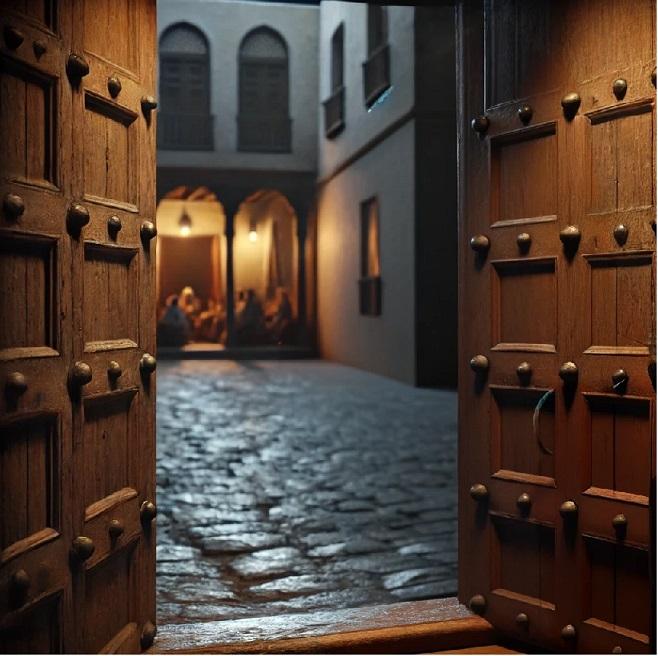Bishr al-Hafi (quddisa sirruhu) was a great wali striving on the path of Allah, a guide in the journey of divine awareness, and a devoted servant of truth. He was celebrated among the Sufis as a figure of deep insight and humility. Bishr benefited greatly from the companionship of Fudayl b. Iyad and was a disciple of his uncle, Ali b. Hashram. He came from a respected family and was the son of a prominent leader in Merv, a city of wealth and distinction. Because of his family’s affluence, his early years were spent in luxury and ease.
As a young man, however, Bishr fell into a life of indulgence and frivolity. After the passing of his father, he inherited a vast fortune, which he squandered on entertainment and drunken revelry. He became a regular at taverns, often found intoxicated and oblivious to the world around him. The wealth he inherited attracted companions who clung to him for his riches, keeping him ensnared in this lifestyle.
One day, while Bishr was hosting a gathering of friends at his home, indulging in drink and merriment, a pious man happened to pass by his house. The man knocked on the door, and Bishr’s maidservant answered. The man asked her, “Is the owner of this house a free man or a slave?”
The maidservant replied, “He is a free man.”
The man remarked, “Indeed, you speak the truth. If he were a slave, he would behave like one, fulfilling the obligations of servitude and humbling himself before his Master, instead of drowning in pleasure and heedlessness.”
Bishr overheard this exchange and was struck to the core. Barefoot and overwhelmed with regret, he ran to the door, but the man had already left. Turning to his maidservant, he asked, “Who was the man you were speaking to?” She described the encounter and pointed in the direction the man had gone. Bishr set out immediately to find him.
When Bishr finally caught up with the man, he asked, “Was it you who spoke with my maidservant at the door?”
“Yes,” the man replied.
Bishr pleaded, “Can you repeat what you said to her?”
The man repeated his words. Hearing them again, Bishr fell to the ground, pressing his face to the dirt, and cried, “The master of that house is indeed a slave—nothing but a slave!” From that moment, he left his home barefoot, his heart heavy with repentance.
Though deeply affected by this encounter, Bishr’s struggle was not over. His old companions and their influence soon drew him back into his former habits. Yet Allah’s plan for him remained, and a moment of divine intervention would soon change the course of his life forever.

One day, while returning home drunk and weary, Bishr saw a piece of paper lying on the ground with the words "Bismillah" (In the name of Allah) written on it. His heart ached at the sight of it discarded and sullied. He picked it up, wiped it clean, anointed it with perfume, and placed it respectfully on the wall of his home.
That night, a pious scholar and wali had a dream. In the dream, a voice addressed him, saying: “Go to Bishr and tell him: You have honored My name, and I have purified and elevated yours. You have adorned My name, and I have adorned yours with beauty. By My glory, I will make your name honored in both this world and the hereafter.”
The scholar, knowing Bishr’s reputation, doubted the dream and thought to himself, Bishr is a sinful man—this dream cannot be true. He performed ablution, prayed, and returned to sleep. Yet the same vision came to him again, and then a third time. Finally convinced, he set out in the morning to find Bishr and deliver the message.
The scholar found Bishr in a tavern and called him outside. “I bring you a message of great importance,” he said.
“Who is it from?” Bishr asked.
“It is from Allah,” the scholar replied.
At this, Bishr began to weep. “Is He angry with me? Will He punish me severely?” he asked.
The scholar recounted the dream in its entirety. Hearing this, Bishr turned to his companions and said, “My friends, I have been called, and I must go. You will not see me here again.” Right then and there, Bishr repented and left the life he had known behind.
At the time of his repentance, Bishr was barefoot. From that moment onward, he vowed never to wear shoes again, saying, “When I repented, I was barefoot. How could I wear shoes now, when I stood before my Lord in humility without them?” It was this act that earned him the name al-Hafi —“the barefoot one.



